 W
WAndroid Studio is the official integrated development environment (IDE) for Google's Android operating system, built on JetBrains' IntelliJ IDEA software and designed specifically for Android development. It is available for download on Windows, macOS and Linux based operating systems or as a subscription-based service in 2020. It is a replacement for the Eclipse Android Development Tools (E-ADT) as the primary IDE for native Android application development.
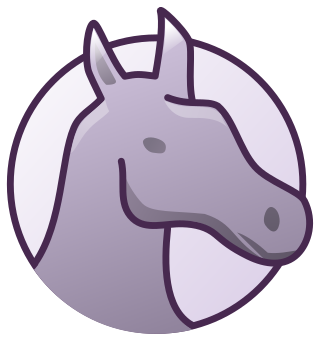 W
WAnjuta is an integrated development environment written for the GNOME project. It has support for C, C++, Java, JavaScript, Python and Vala programming language.
 W
WAptana, Inc. is a company that makes web application development tools for use with a variety of programming languages. Aptana's main products include Aptana Studio, Aptana Cloud and Aptana Jaxer.
 W
WBluefish is a free software advanced text editor with a variety of tools for programming and website development. It supports coding languages including HTML, XHTML, CSS, XML, PHP, C, C++, JavaScript, Java, Go, Vala, Ada, D, SQL, Perl, ColdFusion, JSP, Python, Ruby and shell. It is available for many platforms, including Linux, macOS and Windows, and can be used via integration with GNOME or run as a standalone application. Designed as a compromise between plain text editors and full programming IDEs, Bluefish is lightweight, fast and easy to learn, while providing many IDE features. It has been translated into 17 languages.
 W
WCode::Blocks is a free, open-source cross-platform IDE that supports multiple compilers including GCC, Clang and Visual C++. It is developed in C++ using wxWidgets as the GUI toolkit. Using a plugin architecture, its capabilities and features are defined by the provided plugins. Currently, Code::Blocks is oriented towards C, C++, and Fortran. It has a custom build system and optional Make support.
 W
WDev-C++ is a free full-featured integrated development environment (IDE) distributed under the GNU General Public License for programming in C and C++. It was originally developed by Colin Laplace and first released in 1998. It is written in Delphi.
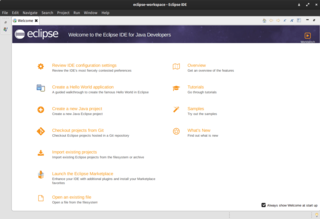 W
WEclipse is an integrated development environment (IDE) used in computer programming. It contains a base workspace and an extensible plug-in system for customizing the environment. Eclipse is written mostly in Java and its primary use is for developing Java applications, but it may also be used to develop applications in other programming languages via plug-ins, including Ada, ABAP, C, C++, C#, Clojure, COBOL, D, Erlang, Fortran, Groovy, Haskell, JavaScript, Julia, Lasso, Lua, NATURAL, Perl, PHP, Prolog, Python, R, Ruby, Rust, Scala, and Scheme. It can also be used to develop documents with LaTeX and packages for the software Mathematica. Development environments include the Eclipse Java development tools (JDT) for Java and Scala, Eclipse CDT for C/C++, and Eclipse PDT for PHP, among others.
 W
WEclipse Che is an open-source, Java-based developer workspace server and Online IDE. It includes a multi-user remote development platform. The workspace server comes with a flexible RESTful webservice. It also contains a SDK for creating plug-ins for languages, frameworks or tools. Eclipse Che is an Eclipse Cloud Development (ECD) top-level project, allowing contributions from the user community.
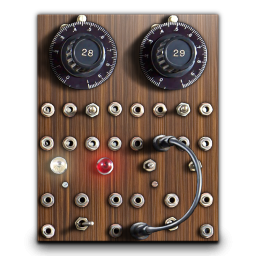 W
WEDI is a free software integrated development environment available under the GNU General Public License version 2.0. It is written in C and runs on any Linux, BSD, and Unix system with limited support for macOS and Windows.
 W
WEiffelStudio is a development environment for the Eiffel programming language developed and distributed by Eiffel Software.
 W
WEmacs or EMACS is a family of text editors that are characterized by their extensibility. The manual for the most widely used variant, GNU Emacs, describes it as "the extensible, customizable, self-documenting, real-time display editor". Development of the first Emacs began in the mid-1970s, and work on its direct descendant, GNU Emacs, continues actively as of 2020.
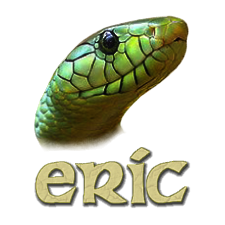 W
Weric is a free integrated development environment (IDE) used for computer programming. Since it is a full featured IDE, it provides by default all necessary tools needed for the writing of code and for the professional management of a software project.
 W
WGambas is the name of an object-oriented dialect of the BASIC programming language, as well as the integrated development environment that accompanies it. Designed to run on Linux and other Unix-like computer operating systems, its name is a recursive acronym for Gambas Almost Means Basic. Gambas is also the word for prawns in the Spanish, French, and Portuguese languages, from which the project's logos are derived.
 W
WGeany (IPA:ʒeːniː) is a lightweight GUI text editor using Scintilla and GTK, including basic IDE features. It is designed to have short load times, with limited dependency on separate packages or external libraries on Linux. It has been ported to a wide range of operating systems, such as BSD, Linux, macOS, Solaris and Windows. The Windows port lacks an embedded terminal window; also missing from the Windows version are the external development tools present under Unix, unless installed separately by the user. Among the supported programming languages and markup languages are C, C++, C#, Java, JavaScript, PHP, HTML, LaTeX, CSS, Python, Perl, Ruby, Pascal, Haskell, Erlang, Vala and many others.
 W
WGNAT Programming Studio is a free multi-language integrated development environment (IDE) by AdaCore. GPS uses compilers from the GNU Compiler Collection, taking its name from GNAT, the GNU compiler for the Ada programming language.
 W
WGNAVI is an open-source visual software development environment that is composed of three major portions: GWindows GUI framework, GNATCOM ActiveX/COM framework, and GWenerator code generator. The inspiration for GNAVI is Delphi and Visual Basic, where the Pascal-family Ada programming language is utilized as a syntactically-similar substitute for Delphi's Object Pascal.
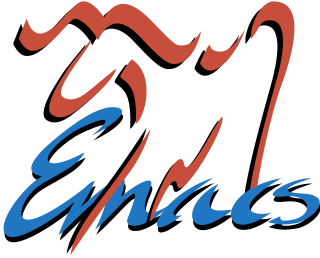 W
WGNU Emacs is a free software text editor. It was created by GNU Project founder Richard Stallman. In common with other varieties of Emacs, GNU Emacs is extensible using a Turing complete programming language. GNU Emacs has been called "the most powerful text editor available today". With proper support from the underlying system, GNU Emacs is able to display files in multiple character sets, and has been able to simultaneously display most human languages since at least 1999. Throughout its history, GNU Emacs has been a central component of the GNU project, and a flagship of the free software movement. GNU Emacs is sometimes abbreviated as GNUMACS, especially to differentiate it from other EMACS variants. The tag line for GNU Emacs is "the extensible self-documenting text editor".
 W
WKDevelop is a free and open-source integrated development environment (IDE) for Unix-like computer operating systems and Windows. It provides editing, navigation and debugging features for several programming languages, and integration with build automation and version-control systems, using a plugin-based architecture.
 W
WKomodo Edit is a free and open source text editor for dynamic programming languages. It was introduced in January 2007 to complement ActiveState's commercial Komodo IDE. As of version 4.3, Komodo Edit is built atop the Open Komodo project.
 W
WKomodo IDE is an integrated development environment (IDE) for dynamic programming languages. It was introduced in May 2000. Many of Komodo's features are derived from an embedded Python interpreter.
 W
WLazarus is a free cross-platform visual integrated development environment (IDE) for rapid application development (RAD) using the Free Pascal compiler. Its goal is to provide an easy-to-use development environment for programmers developing with the Object Pascal language, which is as close as possible to Delphi.
 W
WMonoDevelop is an open-source integrated development environment for Linux, macOS, and Windows. Its primary focus is development of projects that use Mono and .NET Framework. MonoDevelop integrates features similar to those of NetBeans and Microsoft Visual Studio, such as automatic code completion, source control, a graphical user interface (GUI) and Web designer. MonoDevelop integrates a Gtk# GUI designer called Stetic. It supports Boo, C, C++, C#, CIL, D, F#, Java, Oxygene, Vala, JavaScript, TypeScript and Visual Basic.NET.
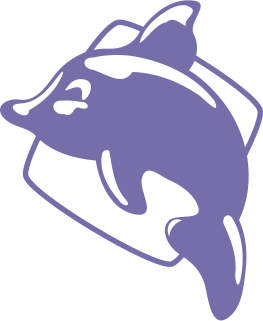 W
WNEdit, the Nirvana editor, is a text editor and source code editor for the X Window System. It has an interface similar to text editors on Microsoft Windows and Macintosh, rather than to older UNIX editors like Emacs. It was initially developed by Mark Edel for Fermilab and released under a very restrictive licence, but today it is distributed under the less restrictive GNU General Public License, and developed as an independent open-source project by a team of developers. Nedit was also distributed with the IRIX operating system.
 W
WNetBeans is an integrated development environment (IDE) for Java. NetBeans allows applications to be developed from a set of modular software components called modules. NetBeans runs on Windows, macOS, Linux and Solaris. In addition to Java development, it has extensions for other languages like PHP, C, C++, HTML5, and JavaScript. Applications based on NetBeans, including the NetBeans IDE, can be extended by third party developers.
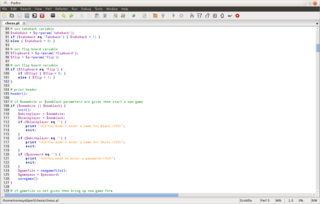 W
WPadre is a multi-language software development platform comprising an IDE and a plug-in system to extend it. It is written primarily in Perl and is used to develop applications in this language.
 W
WPyCharm is an integrated development environment (IDE) used in computer programming, specifically for the Python language. It is developed by the Czech company JetBrains. It provides code analysis, a graphical debugger, an integrated unit tester, integration with version control systems (VCSes), and supports web development with Django as well as data science with Anaconda.
 W
WQt Creator is a cross-platform C++, JavaScript and QML integrated development environment which simplifies GUI application development. It is part of the SDK for the Qt GUI application development framework and uses the Qt API, which encapsulates host OS GUI function calls. It includes a visual debugger and an integrated WYSIWYG GUI layout and forms designer. The editor has features such as syntax highlighting and autocompletion. Qt Creator uses the C++ compiler from the GNU Compiler Collection on Linux. On Windows it can use MinGW or MSVC with the default install and can also use Microsoft Console Debugger when compiled from source code. Clang is also supported.
 W
WQuanta Plus, originally called Quanta, is a web Integrated development environment (IDE) for HTML, XHTML, CSS, XML, PHP and any other XML-based languages or scripting languages. Quanta was licensed under GPL before the release of version 2.0 final.
 W
WTEA is a graphical text editor. Its name is an acronym for Text Editor of the Atomic Era. It is designed for low resource consumption, a wide range of functions and adaptability, and is available for all desktop operating systems supported by Qt 5 or 4.6+, thus also OS/2. Its user interface is localized in several languages.
 W
WThe Unified Code Counter (UCC) is a comprehensive software lines of code counter produced by the USC Center for Systems and Software Engineering. It is available to the general public as open source code and can be compiled with any standard ANSI C++ compiler.
 W
WVim is a clone, with additions, of Bill Joy's vi text editor program for Unix. Vim's author, Bram Moolenaar, based it on the source code for a port of the Stevie editor to the Amiga and released a version to the public in 1991. Vim is designed for use both from a command-line interface and as a standalone application in a graphical user interface. Vim is free and open-source software and is released under a license that includes some charityware clauses, encouraging users who enjoy the software to consider donating to children in Uganda. The license is compatible with the GNU General Public License through a special clause allowing distribution of modified copies "under the GNU GPL version 2 or any later version".
 W
WWaveMaker is a private aPaaS software for building and running custom apps. WaveMaker provides Rapid API App Development & Deployment to build enterprise-grade multi-device apps, and leverages Docker containerization for an app-optimized infrastructure.
 W
WThe Xojo programming environment and programming language is developed and commercially marketed by Xojo, Inc. of Austin, Texas for software development targeting macOS, Microsoft Windows, Linux, iOS, the Web and Raspberry Pi. Xojo uses a proprietary object-oriented language.